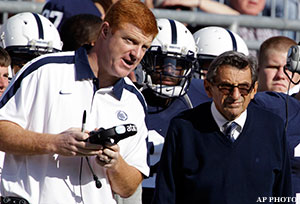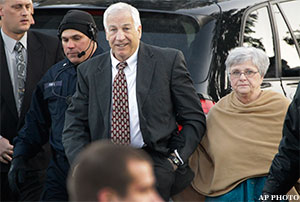
The scene was unimpeachable, a heartwarming slice of homespun Americana. Ma and Pa Paterno. One daughter and three sons. All of them gathered 'round the kitchen table of the family’s modest stone-and-plate-glass home, a table piled high with cornbread and mashed potatoes, the same table where the old man eats and prays.
Oh, and don't forget the high-priced Washington attorney, as well as the hired-gun communications adviser, both monitoring every word -- every whisper, really -- coming out of Joe Paterno's mouth.
Just like your house, right?
In the wake of the Jerry Sandusky child sex abuse scandal, Paterno has every reason to defend himself in the court of public opinion against charges that he: (a) knew too much and (b) did too little. Moreover, he has every right to speak out. Heck, from Herman Cain to Kim Kardashian, mea non-culpa is practically the American way.
On the other hand, just because you can do something doesn't mean you should.
Paterno could have remained quiet. Kept a low profile. Let the legal process run its course. He chose otherwise. Bad move. In his much-hyped recent interview with the Washington Post, he comes across as an ailing octogenarian whose focus ought to be on getting well, as opposed to rehabilitating his tattered image. And that's at best. At worst, he seems like a disingenuous control freak, still trying to bend the world from his sick bed, a man who takes the American public to be, well, fools.
Either way, Paterno didn't do himself any favors.
Start with credibility. Paterno lacked it. The crux of the disappointment and outrage directed at the old coach is simple: When then-Penn State graduate assistant Mike McQueary allegedly told Paterno that he saw Sandusky sexually abusing -- read: raping -- a boy in the shower of the school's football building, the most powerful man in State College reportedly didn't press for details. He didn't call the police. He didn't confront Sandusky. He simply referred McQueary to university athletic director Tim Curley, then went along his merry, character-building way.

Paterno's explanation? As he told the Post, McQueary was vague when describing exactly what he witnessed. Moreover, had he specifically painted a verbal picture of Sandusky anally raping a helpless boy, Paterno wouldn’t have understood what McQueary was talking about.
"You know, [McQueary] didn't want to get specific," Paterno said in the interview. "And to be frank with you I don't know that it would have done any good because I never heard of, of, rape and a man."
In other words: A grown man and father of four children living in a modern America of newspapers and televisions and after-school specials and public service announcements and To Catch a Predator has never, ever heard of child sex abuse of a boy. A supposed classics scholar cannot mentally conceive of pederasty, never mind that it was a common, accepted practice in ancient Greece. A professed Catholic is shocked, just shocked, to the point of total cognitive shutdown by the utterly incomprehensible notion of a man sexually assaulting a boy, despite an unending series of headline-generating scandals that continue to rock the Vatican, scandals involving -- to use Paterno's terms -- boys and rape and a man.
Really, JoePa? That's your excuse?
Happy Valley might be an isolated, provincial throwback to an era of pep rallies and malted shakes; it is not a land of leprechauns and unicorns.
Similarly, Paterno said that the reason he reported McQueary's allegation but declined to follow up – thereby fulfilling his bare minimum legal obligations, if not his moral ones – was because he felt inadequate to the task. As he told the Post, "I didn't know exactly how to handle it and I was afraid to do something that might jeopardize what the university procedure was." That sounds perfectly reasonable -- assuming you know nothing about Paterno's track record, his considerable campus clout and his demonstrated willingness to use it.
The man is less Colin Powell than Douglas MacArthur. When Penn State president Graham Spanier and other school officials asked Paterno to retire in 2004, the coach said no. End of story.

When the Sandusky scandal erupted and engulfed the school, Paterno went rogue, announcing his own retirement at the end of the season, temporarily pre-empting a decision by school administrators to, you know, fire him immediately.
A telling report in the Wall Street Journal said Paterno repeatedly clashed with Penn State’s former chief disciplinarian, Vicky Triponey, over what sort of punishments should be doled out to football players who ran afoul of the law. In a 2005 email, Triponey complained to school leaders that Paterno believed she should have "no interest (or business) holding our players accountable to our community standards. The Coach is insistent he knows best how to discipline his players ... and I think he was saying we should treat football players different from other students in this regard."
Case in point? Five years ago, as many as two dozen Penn State football players broke into an off-campus apartment and were involved in a subsequent brawl. Police filed criminal charges against six players. Triponey's department began an inquiry; the WSJ reported that Paterno was involved in at least six meetings with representatives of the school's judicial affairs department. In one meeting, Triponey reportedly said the players were stonewalling her. She suggested Paterno compel them to tell the truth. In response, Paterno reportedly became angry, arguing that "his players couldn't be expected to cooperate with the school's disciplinary process because, in this case, they would have to testify against each other, making it hard to play football together."
Paterno is a man who spent five years in court fighting the public disclosure of his salary, despite his status as a state employee. A man who labeled a 2008 ESPN report about his football team's legal woes -- 46 Penn State players facing 163 criminal charges over a six-year period -- a "witch hunt" and was unapologetic and dismissive when questioned by the network. A man who walks past a bronze campus statue of himself on his way to work.
In 1995, Paterno directed a profanity-laden postgame tirade at Rutgers coach Doug Graber. In 2007, he was involved in a road rage incident in which he blew his horn and chastised another driver ... for allegedly running a campus stop sign.
But sure: Paterno is the kind of meek, by the book, make-no-waves mid-level bureaucratic scrivener who makes a beeline for his fainting couch at the thought of asserting his personal authority and/or mucking with standard university operating procedures, especially if it involves alleged wrongdoing within his football program.
Paterno expects us to buy this. He expects us to believe, as he told the Post, that he and Sandusky weren't close, that they had a strictly "professional, not social" relationship, even though the two coached major college football together for three decades. He sounds like a weasely, flip-flopping politician. To an uncharitable ear -- one not steeped in the cornpone JoePa-as-beacon-of-all-that-is-true-and-right-with-college-sports mythos -- he seems to hold the public's intelligence in utter contempt. And contempt for the public is not the best public relations strategy.

But give him the benefit of the doubt. Suppose Paterno is being completely open and honest. Suppose he really is what the Post interview paints him to be: A sick, struggling old man who reacted to McQueary’s initial Sandusky allegations with uncharacteristic cowardice and detachment.
Even if that's the case, Paterno still should have kept his mouth shut.
In the Post piece, written with grace and empathy by veteran scribe Sally Jenkins, we are shown an 85-year-old Paterno, confined to a wheelchair, racked by a broken pelvis and radiation and chemotherapy treatments for lung cancer. The former coach wears a wig. He no longer can enjoy bourbon, or even eat much food; he sips cola over crushed ice. He speaks in a raspy whisper because cancer has "robbed him of the breath to say all that he wants to about the scandal he still struggles to comprehend."
Paterno tells Jenkins that he "wanted to build up, not break down.” The shopworn totems of his public persona once again are dusted off for inspection: The football mementos sitting in an unassuming trophy case; that he once paid $9,000 for his house; his listed number in the phone book; the time Paterno turned down more than a million dollars to coach the New England Patriots; that Paterno earned millions less than less-accomplished coaching peers in 2008 (putting aside the issue of market demand for an 80-something Division I football coach). All of this is supposed to add up to something sad, something profound, a tragic portrait of a man out of time. And maybe it does.
Still, the cumulative effect is jarring. Paterno tells Jenkins, "You know, I'm not concerned about me." Thing is, it sure feels the opposite. The whole scene feels as manipulative as reality television, as the Kardashians retaping heart-to-heart conversations to make Kris Humphries come across as History's Greatest Monster. Regardless of Paterno's actual intentions, it feels like Jenkins walked into a setup, an interview intended to elicit sympathy for the coach, while at the same time burnishing the ruins of his legacy.
Now is not the time for that.

Now is the time for truth. For reckoning. For justice. For letting the legal system run its course. Now is the time to feel sympathy for Sandusky's alleged victims -- helpless kids whose lives have been forever altered and destroyed – and not for those who could have done more but didn't. Now is not the time for communications managers and cherry-picked interviews and speaking out so that the public hears your side of the story, a vague, credulity-straining defense of the indefensible. Now is not the time for legacy.
Joe Paterno was a successful coach. He raised a lot of money. People cheered. Young boys likely were raped. Legacy will take care of itself. Caught in a no-win situation of his own making, the man who has won more major-college football games than anyone else can't seem to stop trying. He should know better. Some things you can’t control.
In both his handling of the Sandusky affair and his interview with the Post, Paterno was right about one thing: He was inadequate to the task.
Popular Stories On ThePostGame:
-- Did We Get It Wrong On Joe Paterno?
-- The Most Important Hire A College Football Head Coach Can Make
-- Les Miles: Heart And Heartbreak
-- Time To Strike Against The NCAA







